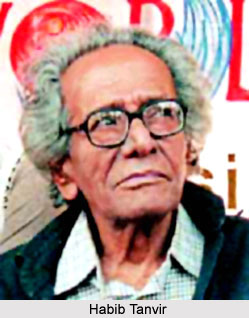 Habib Tanvir is a Hindi language and Urdu language playwright. He is also a great director, actor, manager, poet, and one of the most important theatre personalities of India in the post-Independence scenario.
Habib Tanvir is a Hindi language and Urdu language playwright. He is also a great director, actor, manager, poet, and one of the most important theatre personalities of India in the post-Independence scenario.
Early Life of Habib Tanvir
He was born in Raipur, in the Indian state of Chhattisgarh in 1923. He was from a good Muslim family. He graduated from Nagpur College and started his career in Bombay as a supervisor at an ammunition factory in 1945. He also wrote film reviews in English, poems in Urdu, and joined the Indian People`s Theatre Association as an actor and director. His first work with them was Shantidnt kamgar i.e. "The Labourer, Messenger of Peace" in 1948. This was a street play that he wrote and directed, followed by Shatranj ke mohre or `Chess Pieces` in 1951. It was dramatized by Habib Tanvir from Premchand`s story
Life in Theatre for Habib Tanvir
In 1954, Habib Tanvir moved to Delhi and produced his Agra Bazar i.e. "Bazaar in Agra" with students of Jamia Millia and villagers from Okhla. This was based on the life of the eighteenth-century Urdu poet Nazir Akbarabadi. It drew attention through his crowded, authentic mise-en-scene and use of music. Inspired by it, Qudsia Zaidi formed the Hindustani Theatre along with Tanvir and M. S. Sathyu. On a Government of India scholarship, Tanvir went to England in 1956. He got training at the Royal Academy of Dramatic Art, the Bristol Old Vic, and the British Drama League, and receiving exposure to Western drama and production styles.
 On returning to Delhi, Habib Tanvir did Mitti Ki Gadi i.e. "Clay Cart" in 1958. This was adapted by Zaidi from Sudraka`s Mricchakatika for Hindi Theatre. It introduces a few folk performers from his native Chhattisgarh, then left to create his own group, Naya Theatre in 1959. He started adapting, directing, and scripting plays in English, Hindi, and Urdu. He staged European and Sanskrit theatre, classics as well as folk stories, and propagandist poster theatre.
On returning to Delhi, Habib Tanvir did Mitti Ki Gadi i.e. "Clay Cart" in 1958. This was adapted by Zaidi from Sudraka`s Mricchakatika for Hindi Theatre. It introduces a few folk performers from his native Chhattisgarh, then left to create his own group, Naya Theatre in 1959. He started adapting, directing, and scripting plays in English, Hindi, and Urdu. He staged European and Sanskrit theatre, classics as well as folk stories, and propagandist poster theatre.
The turning point was 1970, when Habib Tanvir revived Agra Bazar with almost its entire cast from Chhattisgarh. Since then, a large contingent of Chhattisgarhi artists became the integral part of Naya Theatre, adding vigorous dance and music to his Hindi-Urdu writing. He tried to make them as convincing and acceptable as possible. The experiment finally succeeded a couple of years later when he let them switch over to Chhattisgarhi dialect on stage. Ideologically leftist, theatrically Brechtian, Habib Tanvir worked with genuine rural performers. He denounced the urban fad of what he called "pseudo-folk theatre".
Tanvir directs all of Naya Theatre`s shows and acts in them. He also directs for other troupes. Other important productions include Brecht`s "The Good Woman of Setzuan" in 1962 and Visakhadatta`s The Signet Ring of Rakshasa i.e. `Mudra-Rakshasa` in 1964. Both were in English translation. His own Charandas Chor in 1975, Bahadur Kalarin i.e. "Heroic Kalarin" in 1978, and Hirma Ki Amar Kahani i.e. "Hirma`s Immortal Story" in 1985 for Naya Theatre were also important. Filmed by Shyam Benegal while still in process, Charandas Chor proved to be Tanvir`s masterpiece. It had drawn full houses for nearly three decades, touring all over India and Europe. His Chhattisgarhi Fida Bai Markam, Govind Ram, Bhulwa Ram, Deepak Tiwari, and others enriched this riotously comic play. This play was about a thief ultimately executed for keeping his word.
Written for his Chhattisgarhi performers, Tanvir`s texts are rarely produced by other groups because their personnel do not possess the unique capabilities of his proteges. He believes in social equality and the whole team, including his wife Monika and daughter Nagin. They live collectively in one complex. After the Delhi administration took away the residential accommodation given to them, he moved to Bhopal with the company. He has regularly written articles on theatre and culture, and was nominated to the Rajya Sabha, the Upper House of Indian Parliament, in 1972-8.




